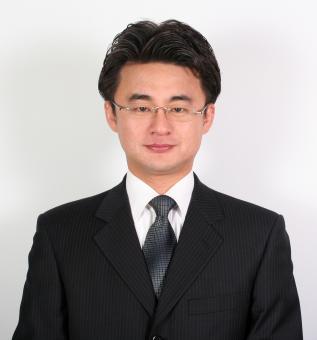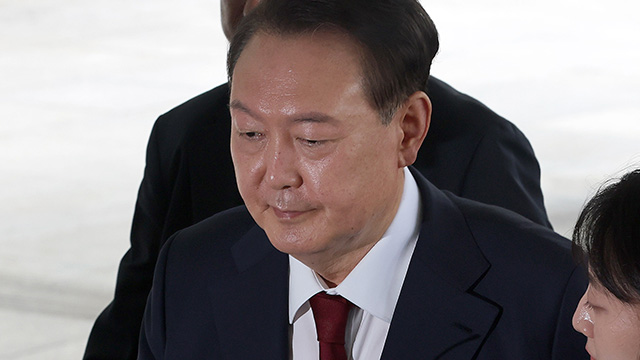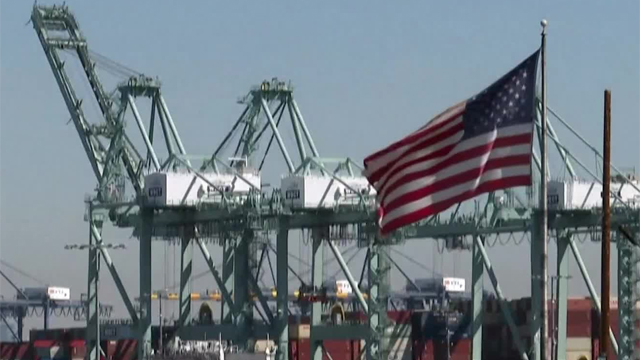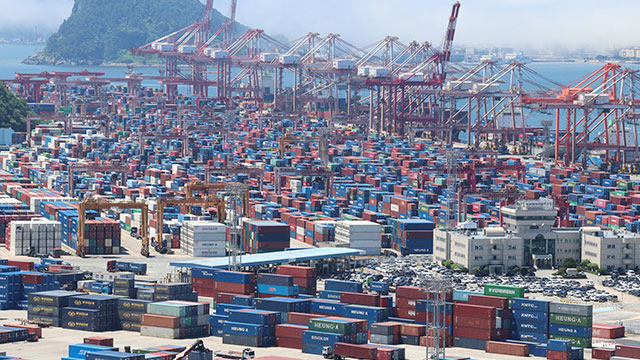Nobel laureates: Two Koreas' economies differ due to political systems
입력 2024.10.16 (00:26)
읽어주기 기능은 크롬기반의
브라우저에서만 사용하실 수 있습니다.
[Anchor]
This year's Nobel Prize in Economic Sciences was awarded to three economists who approached the reasons for economic differences between countries from an institutional perspective.
The stark contrast in economic power between the North and South, despite being of the same ethnicity, is evaluated to stem from the different political systems of democracy versus authoritarianism.
This is reporter Park Il-jung from New York.
[Report]
Recently captured by KBS cameras, this is the site of flood recovery efforts in North Korea.
Heavy machinery has been mobilized, but there are still scenes of people manually carrying timber.
Currently, the GDP gap between South Korea and North Korea is 60 times.
The significant economic disparity is attributed to differences in institutions, according to the research findings of this year's Nobel Prize winners.
[Daron Acemoglu/Nobel Prize Winner/Professor at MIT: "Evidence that for example we have in our 'Democracy and Growth' paper shows, South Korean economy picked up speed after democratization and did so in a more healthy way."]
Among the winners, Professor Acemoglu and Professor James Robinson from the University of Chicago distinguished between inclusive institutions, which open opportunities and benefits to all, and extractive institutions, which benefit only a few, in their book "Why Nations Fail."
They argued that inclusive institutions are more favorable for economic prosperity, and that democracy contributes significantly to this.
Professor Simon Johnson, who also received the award, stated that South Korea's democracy and economic development can serve as a model for other countries.
[Simon Johnson/Nobel Prize Winner/Professor at MIT: "Their achievements are really remarkable compared to what some other countries have been able to pull off. So I think that's the direction which our work should orient people."]
The winners expressed that there is little hope for North Korea and hoped for unification with South Korea under a democratic system.
However, they pointed out that the South Korean economy also faces challenges such as a corporate-centered economic structure and aging population.
Therefore, they advised that having an open mind towards new ideas and technologies and promoting competition is more important.
This is Park Il-jung from KBS News in New York.
This year's Nobel Prize in Economic Sciences was awarded to three economists who approached the reasons for economic differences between countries from an institutional perspective.
The stark contrast in economic power between the North and South, despite being of the same ethnicity, is evaluated to stem from the different political systems of democracy versus authoritarianism.
This is reporter Park Il-jung from New York.
[Report]
Recently captured by KBS cameras, this is the site of flood recovery efforts in North Korea.
Heavy machinery has been mobilized, but there are still scenes of people manually carrying timber.
Currently, the GDP gap between South Korea and North Korea is 60 times.
The significant economic disparity is attributed to differences in institutions, according to the research findings of this year's Nobel Prize winners.
[Daron Acemoglu/Nobel Prize Winner/Professor at MIT: "Evidence that for example we have in our 'Democracy and Growth' paper shows, South Korean economy picked up speed after democratization and did so in a more healthy way."]
Among the winners, Professor Acemoglu and Professor James Robinson from the University of Chicago distinguished between inclusive institutions, which open opportunities and benefits to all, and extractive institutions, which benefit only a few, in their book "Why Nations Fail."
They argued that inclusive institutions are more favorable for economic prosperity, and that democracy contributes significantly to this.
Professor Simon Johnson, who also received the award, stated that South Korea's democracy and economic development can serve as a model for other countries.
[Simon Johnson/Nobel Prize Winner/Professor at MIT: "Their achievements are really remarkable compared to what some other countries have been able to pull off. So I think that's the direction which our work should orient people."]
The winners expressed that there is little hope for North Korea and hoped for unification with South Korea under a democratic system.
However, they pointed out that the South Korean economy also faces challenges such as a corporate-centered economic structure and aging population.
Therefore, they advised that having an open mind towards new ideas and technologies and promoting competition is more important.
This is Park Il-jung from KBS News in New York.
■ 제보하기
▷ 카카오톡 : 'KBS제보' 검색, 채널 추가
▷ 전화 : 02-781-1234, 4444
▷ 이메일 : kbs1234@kbs.co.kr
▷ 유튜브, 네이버, 카카오에서도 KBS뉴스를 구독해주세요!
- Nobel laureates: Two Koreas' economies differ due to political systems
-
- 입력 2024-10-16 00:26:09

[Anchor]
This year's Nobel Prize in Economic Sciences was awarded to three economists who approached the reasons for economic differences between countries from an institutional perspective.
The stark contrast in economic power between the North and South, despite being of the same ethnicity, is evaluated to stem from the different political systems of democracy versus authoritarianism.
This is reporter Park Il-jung from New York.
[Report]
Recently captured by KBS cameras, this is the site of flood recovery efforts in North Korea.
Heavy machinery has been mobilized, but there are still scenes of people manually carrying timber.
Currently, the GDP gap between South Korea and North Korea is 60 times.
The significant economic disparity is attributed to differences in institutions, according to the research findings of this year's Nobel Prize winners.
[Daron Acemoglu/Nobel Prize Winner/Professor at MIT: "Evidence that for example we have in our 'Democracy and Growth' paper shows, South Korean economy picked up speed after democratization and did so in a more healthy way."]
Among the winners, Professor Acemoglu and Professor James Robinson from the University of Chicago distinguished between inclusive institutions, which open opportunities and benefits to all, and extractive institutions, which benefit only a few, in their book "Why Nations Fail."
They argued that inclusive institutions are more favorable for economic prosperity, and that democracy contributes significantly to this.
Professor Simon Johnson, who also received the award, stated that South Korea's democracy and economic development can serve as a model for other countries.
[Simon Johnson/Nobel Prize Winner/Professor at MIT: "Their achievements are really remarkable compared to what some other countries have been able to pull off. So I think that's the direction which our work should orient people."]
The winners expressed that there is little hope for North Korea and hoped for unification with South Korea under a democratic system.
However, they pointed out that the South Korean economy also faces challenges such as a corporate-centered economic structure and aging population.
Therefore, they advised that having an open mind towards new ideas and technologies and promoting competition is more important.
This is Park Il-jung from KBS News in New York.
This year's Nobel Prize in Economic Sciences was awarded to three economists who approached the reasons for economic differences between countries from an institutional perspective.
The stark contrast in economic power between the North and South, despite being of the same ethnicity, is evaluated to stem from the different political systems of democracy versus authoritarianism.
This is reporter Park Il-jung from New York.
[Report]
Recently captured by KBS cameras, this is the site of flood recovery efforts in North Korea.
Heavy machinery has been mobilized, but there are still scenes of people manually carrying timber.
Currently, the GDP gap between South Korea and North Korea is 60 times.
The significant economic disparity is attributed to differences in institutions, according to the research findings of this year's Nobel Prize winners.
[Daron Acemoglu/Nobel Prize Winner/Professor at MIT: "Evidence that for example we have in our 'Democracy and Growth' paper shows, South Korean economy picked up speed after democratization and did so in a more healthy way."]
Among the winners, Professor Acemoglu and Professor James Robinson from the University of Chicago distinguished between inclusive institutions, which open opportunities and benefits to all, and extractive institutions, which benefit only a few, in their book "Why Nations Fail."
They argued that inclusive institutions are more favorable for economic prosperity, and that democracy contributes significantly to this.
Professor Simon Johnson, who also received the award, stated that South Korea's democracy and economic development can serve as a model for other countries.
[Simon Johnson/Nobel Prize Winner/Professor at MIT: "Their achievements are really remarkable compared to what some other countries have been able to pull off. So I think that's the direction which our work should orient people."]
The winners expressed that there is little hope for North Korea and hoped for unification with South Korea under a democratic system.
However, they pointed out that the South Korean economy also faces challenges such as a corporate-centered economic structure and aging population.
Therefore, they advised that having an open mind towards new ideas and technologies and promoting competition is more important.
This is Park Il-jung from KBS News in New York.
-
-

박일중 기자 baikal@kbs.co.kr
박일중 기자의 기사 모음
-
이 기사가 좋으셨다면
-
좋아요
0
-
응원해요
0
-
후속 원해요
0











![[속보] 정성호 “검찰 해체 표현 부적절…국민 요구사항, 검사들도 잘 알 것”](/data/layer/904/2025/07/20250701_86evyp.png)



이 기사에 대한 의견을 남겨주세요.